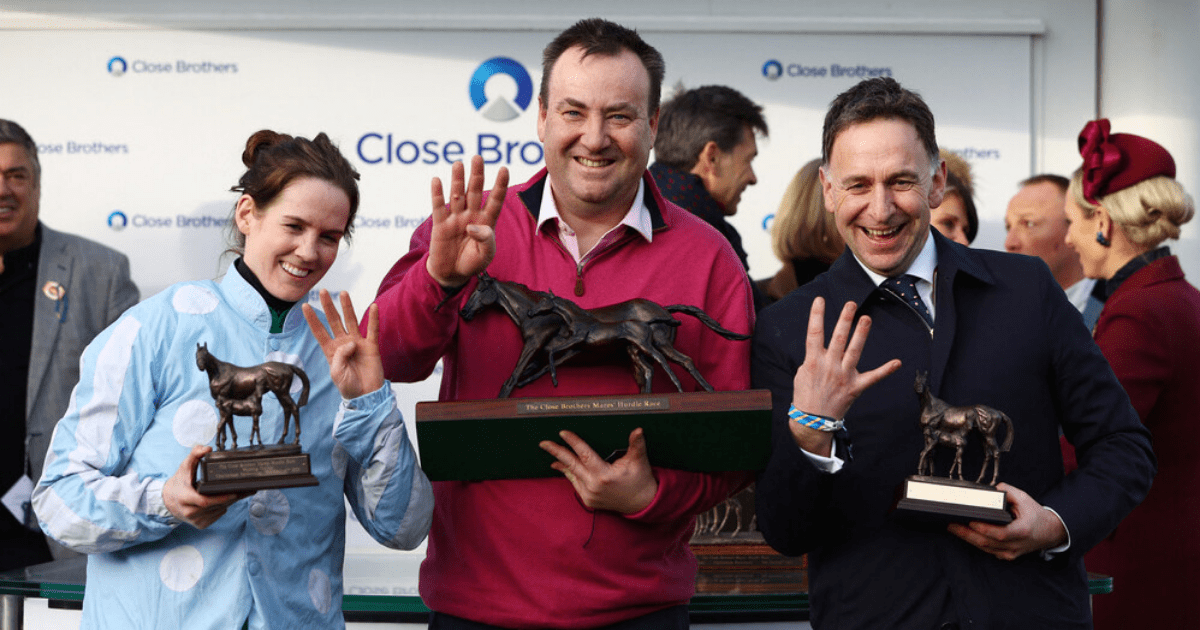Kenny Alexander's Blue and White Silks
The Cheltenham Festival is just around the corner, and what better way to start the countdown than with a 50-1 double in the mares' races? One owner who knows success with mares is Kenny Alexander, whose blue and white silks are synonymous with the incredible Honeysuckle. With the mares' races shaping up to be fiercely contested, Alexander's horses could once again take the victory.
Gala Marceau in the Mares' Hurdle
In the Mares' Hurdle, keep an eye out for Gala Marceau. While she'll face last year's Triumph winner Lossiemouth, she has the advantage of running over a longer distance. Lossiemouth has never raced beyond 2m1f, while Gala Marceau has shown improvement over the extended trip. With a victory over Lossiemouth at last year's Dublin Racing Festival, Gala Marceau's pedigree suggests that 2m4f is where she excels.
Jade De Grugy in the Mares' Novice Hurdle
In the Mares' Novice Hurdle, Willie Mullins' Jade De Grugy is a strong contender. Trained by Mullins and ridden by jockey Paul Townend, Jade De Grugy showcased her ability to stay when winning by 15 lengths over 2m4f at Leopardstown. While the race is shorter at 2m1f, it takes place on the stamina-sapping New course at Cheltenham. Mullins has been successful in this race before, and Jade De Grugy could be his best hope this year.
A 50-1 Double with Paddy Power
Looking for an appealing bet? Pair Gala Marceau with Jade De Grugy for a 50-1 double with Paddy Power. With Alexander's track record with mares and Mullins' expertise, this could be a winning combination. Don't miss out on the chance to make a solid bet for the upcoming Cheltenham Festival.
"Deeply impressive! Jade De Grugy makes a dazzling start to life in Ireland with a convincing win in the opener at Leopardstown for Willie Mullins & Paul Townend."
Remember to gamble responsibly.
Frequently Asked Questions
What is the role of the jockey when training a racehorse?
Jockeys play an essential role in training racehorses. Jockeys not only provide feedback to the horses on their performance during training, but they also educate the horses about racing tactics such as pacing and positioning. A good jockey is able to recognize the horse’s strengths, weaknesses and how they can be improved.
How often is it recommended that racehorses are trained?
Racehorses are trained according to their individual needs, fitness levels, and race schedule. They would usually have a daily regimen consisting of walking, trotting and cantering with more intense work like galloping and breezing a few times a week in order to build speed and stamina. Rest days are equally important to allow the horse to recover and prevent overtraining.
Is it necessary for a racehorse to have a specific type of shoe?
Racehorses typically wear specialized shoes called racing plates, which are lighter and thinner than regular horseshoes. These plates minimize weight while providing the necessary traction for the racetrack. A farrier who is experienced in fitting shoes for racehorses will choose and fit the shoe to match the horse’s specific hoof and racing surface.
What health precautions do you need to take when training a horse for racing?
Meticulous attention to a racehorse’s health is vital in preventing injury and illness. Regular veterinary checks, vaccinations and dental care are important. Monitoring the horse’s signs of fatigue, discomfort or strain is equally important. A well-planned training program that allows for a gradual increase in intensity will help reduce the risk of musculoskeletal injury.
How do I train a racing horse?
It is important to condition a horse gradually. This includes long distance training to build stamina along with shorter workouts that increase speed. It is important to strengthen the horse’s cardiovascular system, muscles, and skeletal structures over time by following a regiment that mimics racing conditions without causing injury.
How can I maintain the mental well-being of my racehorse?
Maintaining a racehorse’s mental health as well as their physical condition is crucial. Mental stimulation, gentle handling, and regular pasture turnout all contribute to the psychological well-being of a racehorse. It is important to ensure that the horse interacts with other horses, and maintain a calm and stable environment. This will help prevent behavioral problems and stress.
Statistics
- The majority of racehorses in training are subject to an exercise regimen that includes being ridden six days a week.
- Statistically, less than 1% of thoroughbred foals born each year will go on to win a stakes race.
- An extensive survey indicated that over 90% of racehorse trainers utilize swimming as a low-impact exercise in their conditioning routines.
- Research has found that a racehorse’s stride length can increase by up to 7% following specific strength and conditioning programs.
- Racehorse mortality rates during racing have been observed to be between 1.5 to 2 deaths per thousand starts, depending on the racing jurisdiction.
- The average cost to train a thoroughbred racehorse for one year can exceed $50,000, accounting for expenses related to training, boarding, and veterinary care.
External Links
bloodhorse.com
grayson-jockeyclub.org
thoroughbred-racing.net
theridinginstructor.net
jockeyclub.com
horseracing.com
How To
How To Choose The Right Diet For A Racehorse
A racehorse’s optimal diet involves finding the right balance between grains, forage and supplements. To maintain gut health, provide high-quality hay and pasture for the majority of the diet. Incorporate grains like oats to deliver accessible energy needed for workouts. Supplements containing adequate vitamins and electrolytes can help with recovery and promote overall health. Working with an equine nutritionalist, you can tailor the diet to meet the individual needs of the horse based on its workload and metabolism.

